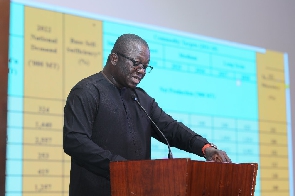At a presidential breakfast meeting on agriculture and agribusiness financing held at Kempinski Hotel, Accra on Monday, the Minister for Food and Agriculture, Dr. Bryan Acheampong principally created awareness about the opportunities that exist for the participation of financial institutions in the PFJ 2 programme. especially when the sector is operating under the capacity to contribute effectively to the development goals of the country.
Addressing farmers and the financial institutions, Dr. Bryan said for the last six months, the Ministry of Food and Agriculture spent considerable time appreciating the potential and challenges of the agriculture sector. It became clear that his expectations have been far exceeded by the existing potential of the sector which can easily change the fortunes of this country if fully tapped.
They include abundant arable land for crop production, especially the virgin valleys suitable for rice production, good soils for the production of a variety of crops, water resources for irrigation, favorable weather, diversity of food commodities, ready markets for exports, and numerous avenues for job creation along the agriculture value chain.
Dr. Bryan indicated that the new initiative for delivering the strategic national objectives and vision for agriculture, known as PFJ 2, is the second phase of the Government’s flagship program, Planting for Food and Jobs, launched in 2017. The enormity of leading the charge to transform Ghana’s agriculture through the new strategy has never been lost on him right from the assumption of office.
It was also noted that, on the downside, the challenges impeding the growth and development of agriculture are in two categories. The first are factors for which we have little or no control such as drought, floods, pests, and diseases. Conversely, the second are factors which are mainly self-inflicted and a drawback to our efforts.
These include misplaced priorities, weak policy implementation, limited infrastructure, undeveloped supply chains, high price volatility, low application of standards for markets, limited use of evidence-based policies, limited support for commercial farming, and the general lack of appreciation of the enormous potential of agriculture.
The introduction of PFJ 2 is therefore a logical response to the situation. The new intervention seeks to revolutionize Ghana’s agriculture through the delivery of smart and innovative solutions to problems. It addresses the critical issue of input supply to farmers at barely any cost to the Government.
It will scale up food production and improve efficiency throughout the entire agriculture value chain, from farm to fork.
Critically, PFJ 2 recognizes the potential contribution of all actors along the agriculture value chain to make the programme a success. Provision has therefore been made for onboarding financial institutions to effectively contribute their quota to the programme.
Business News of Monday, 16 October 2023
Source: MoFA













